
Portugal generated a remarkable 71 % of its electricity from renewables in 2024. Canada weighs in at an almost as impressive 67% (2023). Both countries outperform the global and EU averages and continue to push for renewable growth in the near future.
When looking at broader energy consumption including the transportation sector and industry, Portugal compares even better than Canada. Renewables account for 30-35% of Portugal’s energy use, whereas Canada only hovers around 17%
Canada leverages mostly hydropower for renewables, whereas Portugal has a much more diversified grid. Canada is clearly the laggard when it comes to solar power.
Portugal has taken the ambitious step of completely phasing out coal since 2021, and continues to grow it’s use of solar by 37% per year.
| Country | Hydropower | Wind | Solar | Biomass | Nuclear | Fossil Fuels |
|---|---|---|---|---|---|---|
| Portugal | 28 % | 27 % | 10–14 % | ~6 % | – | ~14 % |
| Canada | 57–62 % | 9–10 % | 1–1.7 % | 1–1.6 % | 13.7 % | 20 % |
The future:
Portugal is aiming for 80% renewables by 2026 and 85% by 2030.
Canada however faces challenges with slower solar and wind power roll-outs, regressive subsidies and tax breaks to the oil & gas industries, and droughts affecting it’s ability to maintain current levels of hydropower usage.